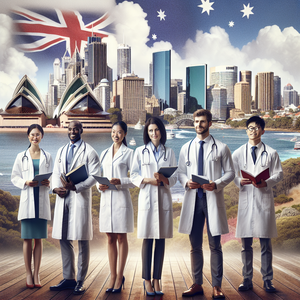From Lab Coats to Travel Coats: Navigating the Transition to a Travel-Based Medical Scientist Role

The first step in transitioning from a lab coat to a travel coat is a shift in mindset. Medical lab scientists are often trained to focus on precision, consistency, and routine. However, traveling for work demands adaptability and a willingness to embrace uncertainty. Those who have succeeded in this transition often speak about the importance of cultivating a flexible attitude. For instance, Sarah, a former clinical lab technician, shared her experience of working in a remote clinic in the Amazon rainforest. 'I had to learn to work with limited resources and adapt my skills to the local context. It was challenging but incredibly rewarding,' she recounted. This adaptability not only enhances their professional capabilities but also fosters personal growth, as they learn to navigate new environments and cultures.
Skills Required for Travel Roles
While the core competencies of a medical lab scientist remain fundamental, additional skills are crucial for traveling professionals. Cultural competency is one of the most significant. Understanding and respecting local customs and healthcare practices can make a substantial difference in effective communication and collaboration with local teams. Furthermore, proficiency in languages can enhance the experience, allowing for deeper connections with patients and colleagues. As John, a travel medical lab scientist, noted, 'Being able to speak the local language broke down barriers and helped me form lasting friendships.' Another essential skill is the ability to manage logistics. Travel medical lab scientists need to navigate visa requirements, housing arrangements, and travel itineraries, often in countries with different bureaucratic systems. Effective time management and organizational skills become paramount, as seen in Emily's story, who juggled multiple projects while working in Southeast Asia. 'I learned to prioritize tasks and set realistic goals for my work, which allowed me to explore the beauty of the local culture during my off time,' she explained. Additionally, technical skills must be complemented by soft skills. Communication, problem-solving, and teamwork are vital as these scientists often work alongside diverse healthcare teams. The ability to remain calm under pressure and think critically can significantly impact the quality of care provided in challenging environments.
Challenges Along the Way
Despite the allure of travel, the transition is not without its challenges. One significant hurdle is the emotional strain of being away from family and friends. For many professionals, leaving a stable environment can evoke feelings of isolation. To combat this, it is crucial to establish a support network, whether through fellow travelers, local communities, or online platforms. Additionally, maintaining regular communication with loved ones can help ease the emotional burden. Another challenge is the potential for professional uncertainty. Travel medical lab positions can be temporary, and job security may be less stable than in traditional roles. However, many professionals find that the experience gained in diverse settings enhances their employability long-term. For example, Lisa, who worked in various countries over the past three years, noted, 'The skills I developed while adapting to different healthcare systems made me a more competitive candidate when I returned home.' Moreover, the varying quality of healthcare facilities can pose a challenge. Adjusting to different levels of resources and equipment can be daunting, but it can also serve as a valuable learning experience, fostering resilience and innovation.
The Rewards of Travel-Based Roles
The advantages of transitioning to a travel-based role far outweigh the challenges. Many medical lab scientists report significant professional growth, enhanced adaptability, and a broadened worldview. Travel opportunities often lead to networking with professionals from various countries, opening doors to new collaborations and career prospects. Additionally, the personal fulfillment that comes from experiencing different cultures and contributing to global healthcare initiatives is immeasurable. As David, who has worked in multiple countries, aptly put it, 'Traveling as a medical lab scientist has enriched my life in ways I never imagined. I’ve learned so much not just about science, but about humanity and resilience.' The opportunity to impact communities positively while advancing one’s career is a powerful motivator for many.
The journey from lab coats to travel coats is an exciting path that offers medical lab scientists the chance to broaden their horizons both professionally and personally. While the transition may come with challenges, the skills acquired, relationships forged, and experiences gained make it a compelling option for those looking to combine their passion for healthcare with a love for travel. For aspiring travel medical lab scientists, embracing the unknown can lead to a fulfilling and adventurous career that not only enhances their professional life but also enriches their personal journey. As the demand for travel medical lab scientist jobs continues to grow, the opportunities for exploration and impact within global healthcare are vast and waiting to be seized.
Traveling Medical Laboratory Technician
Core Responsibilities
Conduct diagnostic tests and analyze lab results in varying healthcare settings, often in remote locations.
Ensure compliance with local and international health regulations while adapting to different laboratory protocols.
Required Skills
Proficiency in various laboratory techniques and technologies, including hematology, microbiology, and molecular diagnostics.
Strong problem-solving abilities to troubleshoot equipment and procedures with limited resources.
Common Employers
Nonprofit organizations, government health agencies, and international health organizations like Médecins Sans Frontières (Doctors Without Borders).
Clinical Research Associate (CRA) - Global Travel Focus
Core Responsibilities
Monitor clinical trials across multiple sites, ensuring compliance with regulatory standards and protocol adherence.
Collaborate with local medical professionals to facilitate patient recruitment and data collection.
Required Skills
Knowledge of Good Clinical Practice (GCP) and the ability to interpret clinical data.
Exceptional communication skills, with an emphasis on cultural sensitivity and adaptability to diverse environments.
Common Employers
Pharmaceutical companies, Contract Research Organizations (CROs), and academic institutions conducting international studies.
Public Health Consultant - International Mobility
Core Responsibilities
Design and implement public health programs in various countries, addressing region-specific health issues and challenges.
Conduct needs assessments and evaluate the effectiveness of health interventions.
Required Skills
Expertise in epidemiology and public health principles, as well as project management skills to oversee multiple initiatives.
Fluency in multiple languages can be a significant advantage for communication in diverse contexts.
Common Employers
Global health organizations such as the World Health Organization (WHO), United Nations (UN), and various NGOs focused on health development.
Traveling Medical Laboratory Scientist
Core Responsibilities
Perform laboratory tests and analyses in temporary or mobile laboratory settings, often in response to natural disasters or health crises.
Train local staff on laboratory techniques and health protocols to ensure sustainability after departure.
Required Skills
Strong analytical skills with a focus on laboratory safety and quality assurance practices.
Experience with mobile lab equipment and the ability to adapt testing methods based on available resources.
Common Employers
Emergency response organizations, humanitarian aid agencies, and international health NGOs.
Remote Healthcare Informatics Specialist
Core Responsibilities
Implement and manage healthcare information systems in various international settings, ensuring data integrity and security.
Provide training and support to local healthcare workers on electronic health record (EHR) systems and data management practices.
Required Skills
Proficiency in healthcare informatics, data analytics, and familiarity with different EHR platforms.
Strong interpersonal skills to communicate effectively with non-technical staff in diverse cultural environments.
Common Employers
Technology firms specializing in healthcare solutions, governmental health departments, and international healthcare organizations.


